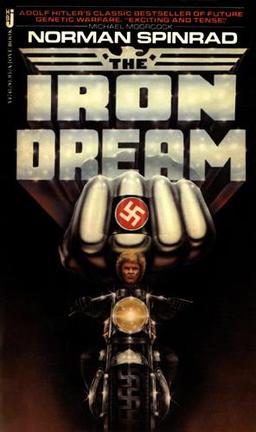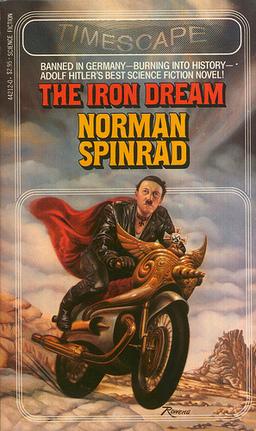Where Truemen Struggle to Preserve Genetic Purity: The Iron Dream by Norman Spinrad
 Every now and then, fandom needs to take a good, hard look at itself. Considering the recent Hugo kerfuffle, I thought it a fine time to read Norman Spinrad’s famous skewering of fan culture, The Iron Dream.
Every now and then, fandom needs to take a good, hard look at itself. Considering the recent Hugo kerfuffle, I thought it a fine time to read Norman Spinrad’s famous skewering of fan culture, The Iron Dream.
First published in 1972, this is a masterpiece of metafiction. It is a book within a book, containing the 1955 Hugo Award winner Lord of the Swastika, written by none other than that famous science fiction writer, Adolph Hitler. We are informed that after dabbling in radical politics in Germany, Hitler moved to New York in 1919. In the 1930s he became a sought-after illustrator for pulp magazines and started writing fiction. He was popular in fannish circles for his fanzine work and for his witty banter at conventions.
His best-known work is Lord of the Swastika, a post-apocalyptic tale where the world has been ravaged by nuclear war and most people have become foul mutants. Luckily there is one nation, Heldon, where the Truemen struggle to preserve humanity’s genetic purity.
Enter Feric Jaggar, a Trueman whose family was exiled due to political machinations and forced to live among the mongrel horde. Lord of the Swastika is the tale of Jagger’s triumphant return to Heldon, where he unmasks a plot by the mutants to take over the country and sully the genetic purity of the last real humans. Jagger’s political star rises, the masses rallying around him as he first faces off against a corrupt government, then unites the nation around him in order to start a massive war to wipe the Earth clean of genetic inferiors once and for all.
The novel is written in a classic pulp style that will remind you of many high fantasy and space opera stories. Spinrad goes overboard with the strong men, complete absence of women, and the concept that violence is the only option for solving problems.
And phallic imagery. Lots of it. While the Truemen and mutants have modern weapons, they prefer to fight with bulbous headed truncheons. Jagger’s truncheon, of course, is the biggest and most bulbous of them all.
 This is where things get uncomfortable. Reading this at 46, I can bring to mind many novels I read as a teenager that were pretty much philosophical twins of Lord of the Swastika. I loved those books. If they had been filled with blatant fascist imagery like Lord of the Swastika, I would have recoiled, but it didn’t take much gloss for me to thrill to tales of strong dictators beating back inferior subhumans. The detail that Spinrad adds of Hitler winning the Hugo brings home his point — speculative fiction and its fandom has a wide stream of totalitarianism wish fulfillment running right through the middle of it.
This is where things get uncomfortable. Reading this at 46, I can bring to mind many novels I read as a teenager that were pretty much philosophical twins of Lord of the Swastika. I loved those books. If they had been filled with blatant fascist imagery like Lord of the Swastika, I would have recoiled, but it didn’t take much gloss for me to thrill to tales of strong dictators beating back inferior subhumans. The detail that Spinrad adds of Hitler winning the Hugo brings home his point — speculative fiction and its fandom has a wide stream of totalitarianism wish fulfillment running right through the middle of it.
Spinrad does his job a bit too well. He’s got Hitler’s writing style down pat — that histrionic, obsessive prose that kept me from ever getting through even a fraction of Mein Kampf. Hitler-the-writer’s obsessions come through again and again — the superiority of the Truemen, the utter lack of any good qualities among the mutants, the love of black leather and torches, the massive displays of group think. Getting through 230 pages of this took some work!
I could well imagine Hitler as a science fiction fan, that kind of enthusiastic bore that always seems to corner me in the con suite, nattering on and on about his ideas as I nod politely, sip my drink, and look for a way out.
These people sometimes catch on, as Hitler did in 1930s fandom. We are told in Hitler’s biographical sketch that after his posthumous Hugo, the snappy black leather uniforms prominent in Lord of the Swastika became all the rage for cosplayers. This ridiculous notion, sadly, rings true. When you think about it, what percentage of cosplay costumes depict some form of Übermensch armed to the hilt to defeat evil but ultimately inferior nonhuman foes?
Of course fandom is changing now, and while that stream of totalitarianism has narrowed, it is still flowing. In The Iron Dream, Spinrad has walked up to its bank and pissed in it.
For a review of a science fiction novel that really was written by a Nazi, check out my review of The Turner Diaries.
PS: I’m off to Tangier for the entire month of October to write my next book, The Last Hotel Room, a contemporary novel set there. I’ll see you all again in November with some posts about Morocco!
Sean McLachlan is the author of the historical fantasy novel A Fine Likeness, set in Civil War Missouri, and several other titles, including his action series set in World War One, Trench Raiders. His historical fantasy novella The Quintessence of Absence, was published by Black Gate. Find out more about him on his blog and Amazon author’s page.
I felt just the same way, Sean – I though the book would have been more effective at half the length; the longer it wnet on, the more deadaningly monotonous it became. But it did a nastily effective job of pointing out how much classic SF is little more than a thinly-veiled power fantasy.
Interesting write up, will have to locate these and have a look. Speaking of totalitarianism wish fulfilment, has anyone encountered those Doomsday Warrior books by Ryder Stacy. I read one years back was awful as I recal.